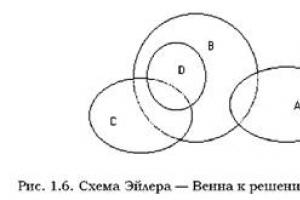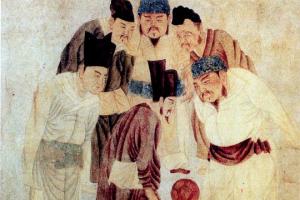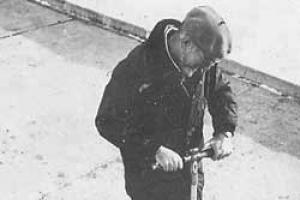The surroundings of Moscow are described. Not far from the monastery wall there is a hut in which Lisa and her mother lived thirty years ago. Her father was “a fairly prosperous villager, because he loved work, plowed the land well and always led a sober life.” But he died. His widow and daughter could not cultivate the land themselves and were forced to rent it out for little money. Lisa, “not sparing her tender youth, worked day and night - weaving canvases, knitting stockings, picking flowers in the spring, and in the summer she took berries and sold them in Moscow.”
"Poor Lisa." Painting by artist O. Kiprensky. 1827
Two years have passed since my father's death. Lisa came to sell lilies of the valley in Moscow. On the street she met a young, pleasant-looking man. It was Erast - “a fairly rich nobleman, with a fair amount of intelligence and a kind heart, but weak and flighty. He led an absent-minded life, thought only about his own pleasure, looked for it in secular amusements, but often did not find it: he was bored and complained about his fate.” Erast offered the girl a ruble for the flowers, but she only took five kopecks. Then the young man asked her not to sell flowers to anyone except him, and found out where she lived. Lisa told her mother about this meeting. The old woman approved of the fact that her daughter did not take extra money: “It is better to feed yourself by your own labors and not take anything for nothing. You don’t know yet, my friend, how evil people can offend a poor girl!”
The next day, Lisa picked up lilies of the valley again and went into town with them. Many people wanted to buy flowers from her, but the girl refused to sell them. She herself looked for Erast, but did not meet him. She threw the flowers into the Moscow River with the words: “So no one can own you!”
The next evening, Erast came to visit Lisa at her house. It seemed to him that in this girl he had found exactly what his heart had long been looking for and what his soul had long been striving for. They began to meet often. Lisa regretted that her lover was not born a simple peasant or shepherd. At first, Erast dreamed of always living happily with Lisa, like brother and sister. All the brilliant amusements of the great world seemed insignificant to him in comparison with the pleasures with which the passionate friendship of an innocent soul nourished his heart. With disgust he thought about the contemptuous voluptuousness with which his feelings had previously reveled. “I will live with Liza, like brother and sister,” he thought, “I will not use her love for evil and I will always be happy!” But gradually platonic love gave way to other feelings. One evening, Lisa told Erast that her mother wanted to marry her to the son of a rich peasant. “She threw herself into his arms, and at that very hour her integrity was destined to perish.” Their dates continued, but now everything has changed. “For Erast, Lisa was no longer that angel of purity that had previously inflamed his imagination and delighted his soul.” They didn't meet for five days. Then Erast appeared and said that his regiment, where he was serving, was going to war.
About two months passed. One day Lisa came to Moscow for rose water, which her mother used to treat her eyes. On one of the big streets she met a magnificent carriage, in which she saw Erast. Lisa rushed to Erast, but his carriage drove past and turned into the courtyard. Erast came out and was about to go to the porch of the huge house, when he suddenly felt himself in Lisa’s arms. Without answering her exclamations, he led her into his office and told her that he was getting married, so she needed to forget him. He put one hundred rubles in Liza’s pocket and ordered the servant to escort the girl out of the yard.
It turned out that Erast played cards during the war, spending almost all his fortune on it, and now he was forced to marry an elderly rich widow who had long been in love with him.
Shocked, Lisa walked without making out the way, and finally went out of the city, to the shore of the pond. On the road she met Anyuta, the daughter of a neighbor. Lisa gave her money for her mother and asked her to tell her that she had been deceived by a cruel man with whom she was in love. After these words, Lisa threw herself into the water. Anyuta rushed to call people for help, but it was too late. The girl was pulled out dead. Lisa's mother died of grief.
The story “Poor Liza,” which became an example of sentimental prose, was published by Nikolai Mikhailovich Karamzin in 1792 in the Moscow Journal publication. It is worth noting Karamzin as an honored reformer of the Russian language and one of the most highly educated Russians of his time - this is an important aspect that allows us to further evaluate the success of the story. Firstly, the development of Russian literature was of a “catch-up” nature, since it lagged behind European literature by about 90-100 years. While sentimental novels were being written and read in the West, clumsy classical odes and dramas were still being composed in Russia. Karamzin’s progressiveness as a writer consisted in “bringing” sentimental genres from Europe to his homeland and developing a style and language for the further writing of such works.
Secondly, the assimilation of literature by the public at the end of the 18th century was such that at first they wrote for society how to live, and then society began to live according to what was written. That is, before the sentimental story, people read mainly hagiographic or church literature, where there were no living characters or living speech, and the heroes of the sentimental story - such as Lisa - gave secular young ladies a real life scenario, a guide to feelings.
The history of the story
Karamzin brought the story about poor Liza from his many trips - from 1789 to 1790 he visited Germany, England, France, Switzerland (England is considered the birthplace of sentimentalism), and upon his return he published a new revolutionary story in his own magazine.
“Poor Liza” is not an original work, since Karamzin adapted its plot for Russian soil, taking it from European literature. We are not talking about a specific work and plagiarism - there were many such European stories. In addition, the author created an atmosphere of amazing authenticity by depicting himself as one of the heroes of the story and masterfully describing the setting of events.
According to the memoirs of contemporaries, soon after returning from the trip, the writer lived in a dacha near the Simonov Monastery, in a picturesque, calm place. The situation described by the author is real - readers recognized both the surroundings of the monastery and the “Lizin Pond”, and this contributed to the fact that the plot was perceived as reliable, and the characters as real people.
Analysis of the work
Plot of the story

The plot of the story is love and, as the author admits, extremely simple. The peasant girl Lisa (her father was a wealthy peasant, but after his death the farm is in decline and the girl has to earn money by selling handicrafts and flowers) lives in the lap of nature with her old mother. In a city that seems huge and alien to her, she meets a young nobleman, Erast. Young people fall in love - Erast out of boredom, inspired by pleasures and a noble lifestyle, and Liza - for the first time, with all the simple, ardor and naturalness of a “natural person”. Erast takes advantage of the girl’s gullibility and takes possession of her, after which, naturally, he begins to be burdened by the girl’s company. The nobleman leaves for war, where he loses his entire fortune at cards. The way out is to marry a rich widow. Lisa finds out about this and commits suicide by throwing herself into a pond, not far from the Simonov Monastery. The author, who was told this story, cannot remember poor Lisa without holy tears of regret.
Karamzin, for the first time among Russian writers, unleashed the conflict of a work with the death of the heroine - as, most likely, it would have happened in reality.
Of course, despite the progressiveness of Karamzin’s story, his heroes differ significantly from real people, they are idealized and embellished. This is especially true for peasants - Lisa does not look like a peasant woman. It is unlikely that hard work would have contributed to her remaining “sensitive and kind”; it is unlikely that she would conduct internal dialogues with herself in an elegant style, and she would hardly be able to carry on a conversation with a nobleman. Nevertheless, this is the first thesis of the story - “even peasant women know how to love.”
Main characters
Lisa

The central heroine of the story, Lisa, is the embodiment of sensitivity, ardor and ardor. Her intelligence, kindness and tenderness, the author emphasizes, are from nature. Having met Erast, she begins to dream not that he, like a handsome prince, will take her into his world, but that he would be a simple peasant or shepherd - this would equalize them and allow them to be together.

Erast differs from Lisa not only in social terms, but also in character. Perhaps, the author says, he was spoiled by the world - he leads a typical life for an officer and a nobleman - he seeks pleasure and, having found it, grows cold towards life. Erast is both smart and kind, but weak, incapable of action - such a hero also appears in Russian literature for the first time, a type of “aristocrat disillusioned with life.” At first, Erast is sincere in his impulse of love - he does not lie when he tells Lisa about love, and it turns out that he is also a victim of circumstances. He does not stand the test of love, does not resolve the situation “like a man,” but experiences sincere torment after what happened. After all, it was he who allegedly told the author the story about poor Lisa and led him to Lisa’s grave.

Erast predetermined the appearance in Russian literature of a number of heroes of the “superfluous people” type - weak and incapable of making key decisions.
Karamzin uses “speaking names.” In the case of Lisa, the choice of name turned out to be a “double bottom.” The fact is that classical literature provided typification techniques, and the name Lisa was supposed to mean a playful, flirtatious, frivolous character. This name could have been given to a laughing maid - a cunning comedy character, prone to love adventures, and by no means innocent. By choosing such a name for his heroine, Karamzin destroyed the classical typification and created a new one. He built a new relationship between the name, character and actions of the hero and outlined the path to psychologism in literature.
The name Erast was also not chosen by chance. It means “lovely” from Greek. His fatal charm and the need for novelty of impressions lured and destroyed the unfortunate girl. But Erast will reproach himself for the rest of his life.
Constantly reminding the reader of his reaction to what is happening (“I remember with sadness...”, “tears are rolling down my face, reader...”), the author organizes the narrative so that it acquires lyricism and sensitivity.
Quotes

“Mother! Mother! How can this happen? He is a gentleman, but among the peasants...”. Lisa.
“Nature calls me into its arms, to its pure joys,” he thought and decided - at least for a while - to leave the big world.”.
“I can’t live,” thought Lisa, “I can’t!.. Oh, if the sky would fall on me! If the earth would swallow up the poor woman!.. No! the sky doesn’t fall; the earth doesn’t shake! Woe to me.” Lisa.
"Now maybe they have already reconciled!" Author
Theme, conflict of the story

Karamzin's story touches on several topics:
- The theme of the idealization of the peasant environment, the ideality of life in nature. The main character is a child of nature, and therefore by default she cannot be evil, immoral, or insensitive. The girl embodies simplicity and innocence due to the fact that she is from a peasant family, where eternal moral values are kept.
- Theme of love and betrayal. The author glorifies the beauty of sincere feelings and talks with sorrow about the doom of love, not supported by reason.
- The theme is the contrast between countryside and city. The city turns out to be evil, a great evil force capable of breaking a pure being from nature (Lisa’s mother intuitively senses this evil force and prays for her daughter every time she goes to the city to sell flowers or berries).
- Theme "little man". Social inequality, the author is sure (and this is an obvious glimpse of realism) does not lead to happiness for lovers from different backgrounds. This kind of love is doomed.
The main conflict of the story is social, because it is because of the gap between wealth and poverty that the love of the heroes, and then the heroine, perishes. The author extols sensitivity as the highest human value, asserts the cult of feelings as opposed to the cult of reason.
In the outskirts of Moscow, not far from the Simonov Monastery, there once lived a young girl Lisa with her old mother. After the death of Liza's father, a fairly wealthy villager, his wife and daughter became poor. The widow became weaker day by day and could not work. Liza alone, not sparing her tender youth and rare beauty, worked day and night - weaving canvases, knitting stockings, picking flowers in the spring, and berries in the summer and selling them in Moscow.
One spring, two years after her father’s death, Lisa came to Moscow with lilies of the valley. A young, well-dressed man met her on the street. Having learned that she was selling flowers, he offered her a ruble instead of five kopecks, saying that “beautiful lilies of the valley, plucked by the hands of a beautiful girl, are worth a ruble.” But Lisa refused the offered amount. He did not insist, but said that from now on he would always buy flowers from her and would like her to pick them only for him.
Arriving home, Lisa told her mother everything, and the next day she picked the best lilies of the valley and came to the city again, but this time she did not meet the young man. Throwing flowers into the river, she returned home with sadness in her soul. The next day in the evening the stranger himself came to her house. As soon as she saw him, Lisa rushed to her mother and excitedly told him who was coming to them. The old woman met the guest, and he seemed to her to be a very kind and pleasant person. Erast—that was the young man’s name—confirmed that he was going to buy flowers from Lisa in the future, and she didn’t have to go into town: he could stop by to see them himself.
Erast was a rather rich nobleman, with a fair amount of intelligence and a naturally kind heart, but weak and flighty. He led an absent-minded life, thought only about his own pleasure, looked for it in secular amusements, and not finding it, he was bored and complained about fate. At the first meeting, Lisa’s immaculate beauty shocked him: it seemed to him that in her he found exactly what he had been looking for for a long time.
This was the beginning of their long dates. Every evening they saw each other either on the river bank, or in a birch grove, or under the shade of hundred-year-old oak trees. They hugged, but their hugs were pure and innocent.
Several weeks passed like this. It seemed that nothing could interfere with their happiness. But one evening Lisa came to a date sad. It turned out that the groom, the son of a rich peasant, was wooing her, and my mother wanted her to marry him. Erast, consoling Lisa, said that after his mother’s death he would take her to him and live with her inseparably. But Lisa reminded the young man that he could never be her husband: she was a peasant, and he was of a noble family. You offend me, said Erast, for your friend the most important thing is your soul, a sensitive, innocent soul, you will always be closest to my heart. Lisa threw herself into his arms - and at this hour her integrity was to perish.
The delusion passed in one minute, giving way to surprise and fear. Lisa cried saying goodbye to Erast.
Their dates continued, but how everything changed! Lisa was no longer an angel of purity for Erast; platonic love gave way to feelings that he could not be “proud of” and which were not new to him. Lisa noticed a change in him, and it saddened her.
Once during a date, Erast told Lisa that he was being drafted into the army; they will have to part for a while, but he promises to love her and hopes to never part with her upon his return. It is not difficult to imagine how hard it was for Lisa to be separated from her beloved. However, hope did not leave her, and every morning she woke up with the thought of Erast and their happiness upon his return.
About two months passed like this. One day Lisa went to Moscow and on one of the big streets she saw Erast passing by in a magnificent carriage, which stopped near a huge house. Erast came out and was about to go out onto the porch, when he suddenly felt himself in Lisa’s arms. He turned pale, then, without saying a word, led her into the office and locked the door. Circumstances have changed, he announced to the girl, he is engaged.
Before Lisa could come to her senses, he took her out of the office and told the servant to escort her out of the yard.
Finding herself on the street, Lisa walked wherever she looked, unable to believe what she heard. She left the city and wandered for a long time until she suddenly found herself on the shore of a deep pond, under the shadow of ancient oak trees, which several weeks before had been silent witnesses to her delight. This memory shocked Lisa, but after a few minutes she fell into deep thought. Seeing a neighbor's girl walking along the road, she called her, took all the money out of her pocket and gave it to her, asking her to tell her mother, kiss her and ask her to forgive her poor daughter. Then she threw herself into the water, and they could no longer save her.
Liza’s mother, having learned about the terrible death of her daughter, could not withstand the blow and died on the spot. Erast was unhappy until the end of his life. He did not deceive Lisa when he told her that he was going to the army, but, instead of fighting the enemy, he played cards and lost his entire fortune. He had to marry an elderly rich widow who had been in love with him for a long time. Having learned about Liza’s fate, he could not console himself and considered himself a murderer. Now, perhaps, they have already reconciled.
The narrator tells about the surroundings of the Sinov Monastery, beautiful at any time of the year. He observes and represents the monks living in their cells, historical events associated with the monastery.
Here she lived with her old mother in a now collapsed hut not far from the monastery. The house stood near a birch grove in a meadow about 30 years ago. Her father was wealthy, sober and hard-working. When he died, Lisa was 15 years old. After his death, the land was given for rent, the mother grew weaker, yearning for her beloved husband. Lisa wove linen, knitted stockings, picked flowers and berries and sold them in Moscow. Her mother dreamed of marrying off her daughter so she could die in peace.
One spring, seventeen-year-old Lisa went to sell lilies of the valley. The young man wanted to pay a whole ruble for them, but Lisa did not take the ruble, because the flowers cost 5 kopecks. The young man said that he would like her to pick flowers just for him. He asked Liza's address.
Lisa told everything to her mother, who praised the girl for not taking extra money.
The next day Lisa picked lilies of the valley. She waited until the evening, and then threw the flowers into the Moscow River, not wanting to sell them to others.
The next day in the evening Lisa was spinning by the window and singing. Suddenly she pulled back from the window, seeing that same young man. A young man who called himself Erast suggested that his mother buy Liza’s products directly from their home so that Liza would not go into the city. Mother was very happy, because she was always worried when Lisa left. She wishes her daughter the same groom. Lisa is confused.
Erast was a rich nobleman, smart and kind, but weak and flighty. He became disillusioned with secular amusements and sought the naturalness described in idylls. Seeing Lisa, he thought that he had found his ideal.
Lisa slept poorly that night and came to the river bank before dawn. Nature gradually came to life, the shepherd drove his flock. Lisa dreamed of what would happen if Erast was a peasant, a shepherd. Suddenly Erast sailed to her on a boat. He took her hand, kissed her and said that he loved her. Lisa also confessed her love. For two hours they sat on the grass, looking into each other's eyes. Erast promised to love Lisa always. He asked not to say anything to his mother so that she would not think anything bad. Lisa reluctantly agreed.
Lisa and Erast saw each other every evening when Lisa's mother went to bed. Their embrace was chaste. Erast decided to retire from secular amusements for a passionate friendship with the shepherdess (as he called Lisa). He would like to love her all his life like a brother. But did he know his heart?
Erast, at Lisa’s request, often visited her mother and loved to listen to the old woman’s stories about her tender relationship with her husband Ivan.
A few weeks later, Lisa showed up on a date looking sad. A rich groom from a neighboring village wooed her. Mother is upset by Lisa’s refusal. She doesn’t know about the love of her daughter and Erast. Erast promises, after his mother’s death, to take Liza with him and live with her in a village in the forest, because Liza’s peasant origins are not important to him, but her soul is important. Lisa rushed into his arms and lost her virginity.
A thunderstorm began, Lisa was afraid of God's punishment. Erast accompanied her home, promising to love her as before.
On subsequent dates, Erast no longer had enough manifestations of platonic love. He could desire nothing more and could not be proud of his feelings. Lisa lived only for Erast, and he was no longer ready to see her every evening.
One day Erast did not come for 5 days, and then announced that he was going to war with his regiment. He asks the girl not to cry and take care of herself.
The young man leaves money to Lisa’s mother so that Lisa does not sell her work to anyone else in his absence. The old woman wishes the good master a quick return and dreams of inviting him to her daughter’s wedding and making him godfather of her grandchildren.
Saying goodbye at dawn, Lisa and Erast cried. When Erast left, Lisa fainted. Only the thought of her mother prompted her to return home. The girl hid her melancholy from her mother.
Two months later, Lisa went to Moscow to get rose water for her mother. She saw Erast getting out of a magnificent carriage. Lisa rushed to him. Erast took her hand, led her to his office and said that circumstances had changed, he was engaged and asked Lisa to leave him alone. Erast said that he loved Lisa and gave her 100 rubles, asking the servant to escort her from the yard.
Erast was actually in the army, lost his fortune at cards, and upon his return planned to marry an elderly rich widow, who had long been in love with him, in order to improve his affairs. The author cannot justify Erast.
Lisa, finding herself on the street, thought that Erast loved someone else. In confusion, she fainted. When the girl approached the pond where she met Erast, she saw the neighbor’s fifteen-year-old daughter Anyuta. Lisa gave her 10 imperials and asked her to take them to her mother and apologize for Lisa to her, because she had hidden her love for the cruel man who cheated on her. Then Lisa threw herself into the lake. Anyuta called people from the village who pulled Lisa out, but she was already dead.
Not far from the city of Moscow, next to the Simonov Monastery, there lived a beautiful girl with her mother and her name was Lisa. Her father died long ago. Once upon a time, during her father’s lifetime, they were quite rich, but after his death, her mother began to weaken and they became very poor. Young Lisa tried her best, and sometimes she didn’t even take care of herself at all: she made canvases, stockings, picked wildflowers, and even on hot summer days she didn’t hide in the shade, but picked berries. Everything she could collect or make she sold in Moscow.
It's been two years since her father passed away.
Already in the warmer spring, she collected lilies of the valley and sold them at the market. One day she met a handsome, well-dressed young man who, as soon as he found out that she was selling flowers, decided to buy them from her and offered much more money than they were worth. But Elizabeth was a modest girl, and she refused such generosity from an unfamiliar citizen. He didn't insist, but in the future he asked her to pick flowers just for him.
Having run home, Lizonka told her mother everything, she was so inspired that she collected the best flowers and the next day ran to the city, hoping to meet a wonderful stranger. But he wasn't there. Lisa was very upset and even threw the flowers into the river. A day passed and the stranger appeared on the threshold of her house. Lisa, seeing him, rushed to her mother. Elizabeth's mother greeted the guest with honor. That same evening, Lisa learned that the man’s name was Erast. Erast said that he really wanted Lizonka to pick flowers just for him, and that he didn’t have to go to the market, he would come to Liza’s house for them himself.
Erast had a great fortune, he was smart and kind, but he could not settle down, he was attracted to social life and all the fun that came with it. Once upon a time he was simply amazed by the innocence and beauty of the young lady. They often met and hugged, but their meetings were absolutely innocent.
The mother decided to give Elizabeth down the aisle, since quite recently a good young man with a sufficient fortune came to them to woo. Lisa understood that she had no future with Erast, since she was a peasant and he was a nobleman. In upset feelings, Elizabeth almost made a mistake in Erast’s arms, but soon pulled herself together. Lisa said goodbye to Erast.
They still dated, but their dates weren't the same. Erast no longer saw purity in her, as he was overcome by platonic love. Lizonka noticed all this and this made her sad.
Erast was drafted into the army. That parting was very difficult for Liza, but Erast promised that as soon as he returned, they would never part.
Two months dragged on forever. One day Lisa went to Moscow. She saw her lover in the crowd and rushed into his arms, but Erast abruptly led her into his office and explained that life had taken a strange turn and he was getting married soon. Elizabeth was taken out of the house by servants.
The girl was very upset, she walked at a quiet pace, not noticing anyone or anything on her way. During this time, she had already managed to leave the city. When she woke up, she realized that she was next to a pond. Just recently she was happy here with Erast, but now everything is quiet and even the luxurious oak trees did not bring her any joy. Memories came flooding back to Elizabeth and she went deep into her dreams and fantasies.
A young girl was passing nearby. Lisa gave her all the money she had earned today at the market and told her to bring it to her mother and ask her to apologize for her actions. And not a minute later she threw herself into the pond.
Elizabeth's mother died of grief. And Erast married an elderly lady, since he had lost everything before. When he found out about Lisa, he realized that it was he who killed her and could not forgive himself for this.
A short retelling of “Poor Liza” in abbreviation was prepared by Oleg Nikov for the reader’s diary.








